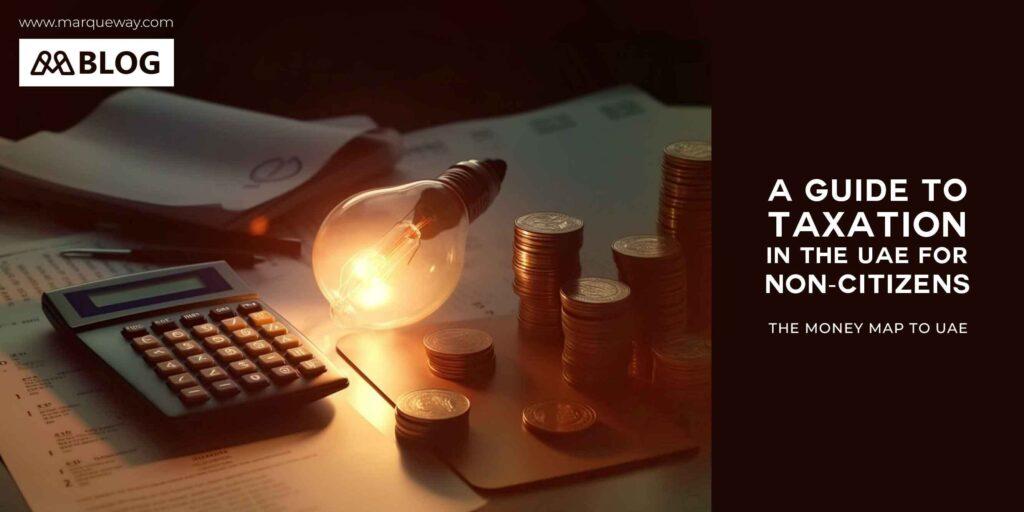
The Money Map to UAE
Are you a foreigner who is looking to have a bright future by setting up a business in Dubai? Are you having this dream and not aware of the tax system that works over here. Don’t worry, this blog will help you have a firm grip on the taxation in the UAE for non-citizens. This is a nation that holds the best tax system that gives immense benefits for company setups. The UAE holds no income tax, tax-free zones for businesses, and a Value Added Tax (VAT) levied at a low 5% rate on goods and services.
This blog lights up your way in setting up a business in Dubai with a clear vision on the VAT implications and tax laws. Staying informed to the recent tax laws couldn’t afford to miss if you dream of having a bright future in the UAE. Read more to know the important facts related to this. We are sure that this blog will be a great guide for you.
Income Tax in UAE for foreigners
United Arab Emirates is often hailed as a tax haven due to the exceptionally low tax system for individuals and businesses. The UAE has no federal income tax, personal income tax, or corporate tax (with some exceptions such as oil and gas companies, foreign banks, etc.). The country does not levy wealth tax, inheritance tax or capital gains tax. This makes UAE more widely recognized as a common tax haven, often referred to as a tax-free country. In particular, the UAE does not impose taxes on income, savings or capital gains.
What is Value Added Tax in the UAE?
Value-added tax (VAT) in the United Arab Emirates (UAE) comes with certain exclusions and conditions that are not limited. These exemptions apply to VAT exports of goods and services from GCC member states, international transport, crude oil and natural gas, primary residential real estate, and the use of specific services such as health and education.
Non-resident companies supplying goods or services liable for VAT in the UAE are not eligible for the registration requirement, which means they must register for VAT regardless of turnover in due course if resident businesses register for VAT if their annual turnover exceeds AED 375,000. However, if their income exceeds AED 187,500, they can also opt for voluntary enrollment.
Foreigners starting a business setup in Dubai should also be aware of other indirect taxes. Goods imported into the UAE are usually subject to a tax of 5% based on the CIF (cost, insurance, freight) value of the imported goods. Prices vary for specific products, such as alcohol and tobacco.
In addition, the UAE imposes taxes on specific items deemed harmful to human health or the environment, commonly referred to as “sin taxes.” Each emirate deals with hotel taxes, and property transfers tax them separately. Dubai, for example, imposes a tourist dirham fee on hotel guests and hotel rentals and charges a 7% municipal fee for each hotel sale.
Businesses and individuals operating in the UAE should carefully consider these taxes and regulations to ensure compliance with the country’s tax laws and regulations.
The tax benefits for foreign business setup in Dubai
Below mentioned are the tax benefits for foreigners who wish to have a business setup in Dubai:
Absence of Property and Wealth Tax: The UAE does not impose property or wealth taxes, making it an attractive destination for individuals and businesses. While there may be municipality taxes on properties based on annual rental value, there are no direct property or wealth taxes levied by the government.
Tax Obligations for Foreign Companies: Foreign companies operating in the UAE need to understand their tax obligations, which can vary based on the nature and location of their business activities. This includes compliance with corporate tax laws and regulations.
Corporate Tax in UAE: The UAE has recently implemented a Federal Corporate Tax (CT) Law, which applies to all commercial activities across the Emirates. The law introduces varying tax rates based on taxable income, with exemptions for companies below a certain income threshold.
Tax-Free Zones for Foreign Businesses: The UAE offers more than 30 tax-free zones, each with its own set of tax, customs, and import regulations. Businesses operating in these zones may enjoy tax benefits, including a 0% tax rate, depending on their activities.
Taxes on Branches of Foreign Companies: Understanding the UAE Corporate Tax Law is essential for branches of foreign companies operating in the UAE. Such branches may be considered Permanent Establishments, potentially subjecting their income to UAE Corporate Tax.
Understanding Double Taxation Avoidance Agreements: The UAE has signed Double Taxation Avoidance Agreements (DTAAs) with several countries. These agreements help prevent double taxation on the same income for international companies operating in the UAE. DTAAs can impact how taxes are calculated and paid, depending on the specific agreement with a foreign country.
Practical Implications of VAT for Foreigners in the UAE:
VAT Imposition: VAT is imposed in the UAE and may impact your cost of living depending on your lifestyle and spending habits. The government uses VAT revenue to fund public services.
Mandatory VAT Registration: If you run a business in the UAE with taxable supplies and imports exceeding AED 375,000 per year, VAT registration is obligatory. This also applies to non-UAE companies if no one else is responsible for taxing residents who pay VAT on their supplies. Voluntary registration is possible if your supplies exceed AED 187,500 annually.
VAT Refunds for Tourists: Foreign businesses and tourists pay VAT but can claim refunds on VAT paid for purchases during their stay through an electronic system. Validation at the airport within 90 days of purchase is required.
Impact on Purchasing Power: VAT introduction may affect your purchasing power depending on your lifestyle and spending habits.
VAT Reverse Charge Mechanism (RCM): RCM requires buyers or end customers to pay tax directly to the government. This relieves non-resident suppliers from VAT registration and accounting in their buyers’ location, mainly for cross-border transactions.
Preparing for Tax Filing: Expatriates in the UAE should familiarize themselves with the tax landscape.
Gathering Documents: For corporate tax registration, gather essential documents like Trade License, owner/partners’ passports and Emirates IDs, Memorandum of Association (MOA) or Power of Attorney (POA), and contact details. An Annual Financial Audit Report is also required.
Understanding VAT Registration: UAE-resident businesses exceeding AED 375,000 in taxable supplies and imports within 12 months must register for VAT. Non-UAE companies making taxable supplies must also register.
Tax Filing Deadlines: Ensure you are aware of tax filing deadlines to avoid penalties. Businesses have nine months from the end of the tax period to submit returns and pay federal corporate tax. U.S. Green Card holders must file annual U.S. tax returns if residing in the UAE.
Penalties for Non-Compliance: Non-compliance with tax regulations can lead to significant penalties introduced in August 2023. Penalties may apply for late submission, payment, record maintenance, and failure to notify tax authorities of changes in tax records. Staying informed and complying with deadlines is crucial.
Reduce Your Stress with Marqueway Business Setup Consultants in Dubai
This blog has covered all areas of taxation in the UAE for foreigners. There are several factors to consider when it comes to taxes or even starting a business in Dubai, which can be stressful at times.
Don’t worry; all you need to do is contact a Marqueway business setup consultant in Dubai. With our professional and innovative approach to procedures and client interactions, we ensure that you may establish and manage your business in Dubai with minimal stress.




